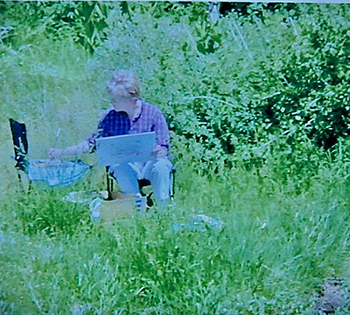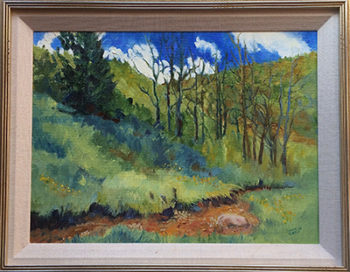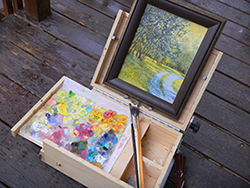Artistic Lines
from Joan Justis
September 2017
joanjustis.com #joanjustisstudios
Artistic communities sponsor “en plein air” competitions requiring artists to paint an image while outdoors “in plain air”. They obtain from the sponsors a clean labeled canvas. Within a given period of time the artist is to select an outdoor scene, paint the view while outside and return the canvas. Some competitions last 24 hours, some several days.
It is a delightful reason to be immersed in the outdoors while painting the beauty and sites that attract us as artists. The challenge with oils is working in wet paint with difficult weather and light conditions and insects and bystanders. Some plein air paintings are studies for studio paintings. But the expressiveness and color choices of a plein air painting delight the senses.
Some plein air paintings are studies for studio paintings. But the expressiveness and color choices of a plein air painting delight the senses.
During the 1800’s this technique gathered popularity with the impressionists desire to portray light and it’s color changes with accuracy. But it was nearly impossible for artists to paint outside of their studios because they needed to grind and mix their own paints.
In 1841 John Goffe Rand, an American, invented metal tubes for storing and carrying paints, and William Winsor patented it and added the screw on cap. This is said to be the reason that Impressionists were able to create light filled, color sensitive images.
The french easel was invented about the same time allowing artists to carry a collapsible easel with built-in palette. (I use a pochade box to carry paints, brushes, and a small canvas.)
Claude Monet (1840-1946) and Pierre-Auguste Renoir (1841-1919), John Singer Sargent (1856-1925) and Robert Wood (1889-1979) developed their styles doing much of their work using plein air techniques.
You might find interesting the site given below. http://www.winsornewton.com/na/discover/articles-and-inspiration/from-the-archives-history-of-the-metal-paint-tube







